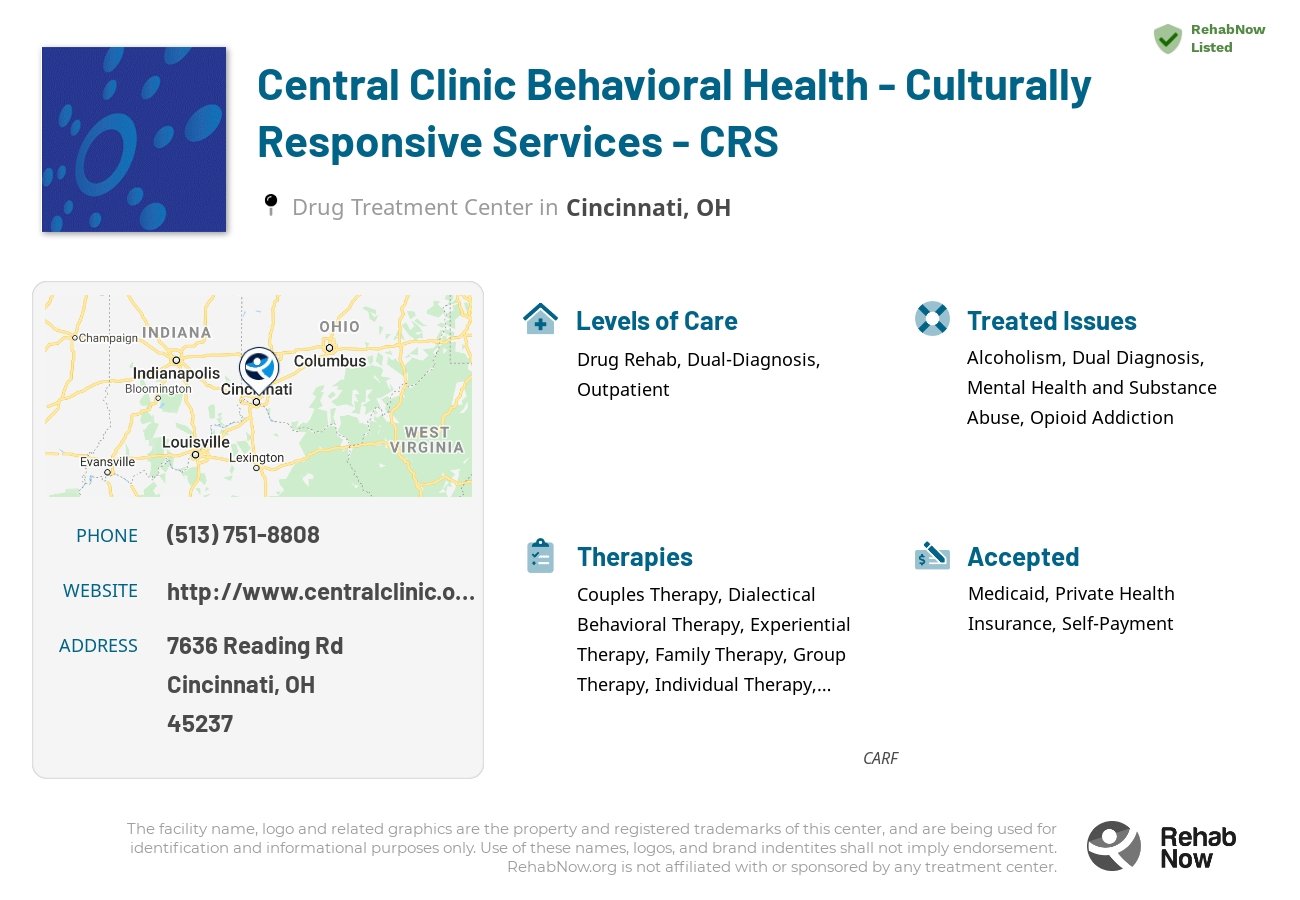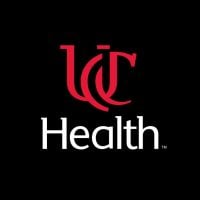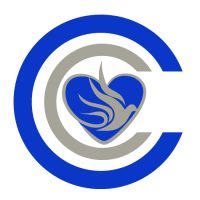Central Clinic Behavioral Health - Culturally Responsive Services - CRS
Drug Rehab Center in Cincinnati, Ohio
Central Clinic Behavioral Health provides culturally responsive treatment to individuals struggling with addiction and mental health in Cincinnati, Ohio through a range of therapy options and levels of care, accepting all forms of private health insurance.
About This Cincinnati, OH Facility
Central Clinic Behavioral Health offers culturally responsive services to individuals in Cincinnati, Ohio struggling with alcoholism, opioid addiction, dual diagnosis, and drug addiction. They provide a variety of levels of care, ranging from drug rehab, dual-diagnosis and outpatient to best meet the needs of their patients. As a CARF-accredited organization, Central Clinic Behavioral Health is dedicated to providing excellent treatment for individuals who come to them for help.
Central Clinic Behavioral Health utilizes a variety of therapies, such as couples therapy, dialectical behavioral therapy (DBT), experiential therapy, family therapy, group therapy, individual therapy, nutrition therapy, and trauma therapy, to provide a comprehensive treatment plan tailored to each patient's needs. All forms of private health insurance are accepted at Central Clinic Behavioral Health and individuals also have access to a wide range of mental health professionals affiliated with the clinic. The organization is committed to offering a safe and supportive environment for those seeking recovery.
Genders
Ages
Modality
Additional
Accreditations

CARF
The Commission on Accreditation of Rehabilitation Facilities (CARF) is a non-profit organization that specifically accredits rehab organizations. Founded in 1966, CARF's, mission is to help service providers like rehab facilities maintain high standards of care.
Conditions and Issues Treated
Opioid addiction treatment facilities in Ohio, like Central Clinic Behavioral Health - Culturally Responsive Services - CRS cover both illegal and prescription opioids abuse. Most plans include detoxification and subsequent medications to ease the process. Behavioral therapies and counseling are also necessary to resolve the root cause of addiction.
A dual diagnosis is when someone deals with both alcohol and mental or emotional disorder. Emotional trauma, bipolar disorder, schizophrenia, depression can be part of dual diagnosis therapy. It must happen simultaneously to get care for these conditions to handle any of them effectively.
Levels of Care Offered
This center offers a variety of custom treatment tailored to individual recovery. Currently available are Drug Rehab, Dual-Diagnosis, Outpatient, with additional therapies available as listed below.
An outpatient treatment program is set up to help with alcohol or drug addiction, or a co-occurring disorder. The patient must attend the Ohio facility for their therapy and other programs but are able to return home each night. The frequency of mandatory attendance decreases after much of Central Clinic Behavioral Health - Culturally Responsive Services - CRS‘s program is complete.
Central Clinic Behavioral Health - Culturally Responsive Services - CRS‘s Therapies & Programs
Treatment programs include individual therapy for the greatest chances of success. Customized individual therapy is counseling involving you and your Central Clinic Behavioral Health - Culturally Responsive Services - CRS counselor. Individual therapy leads to greater peace and understanding about your triggers for addiction.
Spousal relationships bear the brunt of alcohol and drug dependence. It becomes critical to submit the relationship to couples therapy to prevent straining it further. Some facilities like Central Clinic Behavioral Health - Culturally Responsive Services - CRS in Cincinnati, OH offer couples therapy options to manage intimate partnerships amid the recovery process. Other couples-focused treatment plans can provide the patient and their partner tools to get things back to normal.
When family members are more proactive and involved in the treatment procedure, it encourages the patient to advance his or her progress. Moreover, it shouldn’t be ignored that genetics play a role when it comes to addiction, so it’s better to approach the problem as a unit. Also, with proper education, family members can help an individual avoid addiction triggers and guide him or her in making lifestyle changes necessary for his or her sobriety.
It has been said that unhealed trauma is the root of most addictions. Trauma therapy is a way of addressing trauma while in a safe situation in order to heal. Healing past traumas and introducing coping strategies are strong foundations for sustained recovery from addiction. This may involve individual or group counseling or both, in a Cincinnati, OH facility. Other forms of therapy have been proven to assist in healing past traumas.
Dialectical Behavior Therapy (DBT) helps those who attend Central Clinic Behavioral Health - Culturally Responsive Services - CRS understand how their feelings, beliefs, and thoughts affect their behaviors. DBT is particularly useful for people with self-harming behaviors, as well as those with substance abuse disorders. DBT teaches people how to tolerate distress, regulate their emotions, and how to become mindful.
Cognitive Behavioral Therapy (CBT) is a type of psychotherapy that focuses on the underlying thoughts and behaviors that caused the problem of addiction in the first place and may cause a relapse. Negative feelings are common in substance abuse disorders, and if not recognized, they can cause co-occurring disorders.
CBT involves strategies that help to change the thinking and behavioral pattern by cognitive restructuring. In simple terms, it helps to remove negative thoughts and provides long-term benefits. Also, CBT promotes self-awareness, self-control, and healthy ways to respond to negative thoughts. It can be administered as a mono-therapy as well as a part of combination therapy.
Addiction commonly results in varying levels of malnutrition, vitamin and mineral deficiencies. This can be reflected in weight loss, hair loss or hair changes, skin irregularities and damage to multiple internal body functions. While in active addiction meals can be skipped or replaced by drugs or alcohol. Eating correctly to replace lost vitamins and minerals while balancing your diet can build confidence while restoring your health from the inside out.
Nicotine Replacement Therapy (NRT) helps smokers get nicotine into their system without resorting to smoking. It’s a way to help people quit smoking without going cold turkey and experience aggressive withdrawal symptoms. The products (in the form of gums, sprays, patches, inhales, or lozenges) used in NRT provide the body with nicotine, excluding the toxic substances found in tobacco.
NRT treatment at Central Clinic Behavioral Health - Culturally Responsive Services - CRS in Cincinnati, Ohio lowers down nicotine cravings, so the patient does not go through physical weakness while dealing with the emotional and mental stress of quitting smoking. Coupling NRT with counseling and other means of support gives long-term smokers a better chance of removing their unhealthy habit.Patient Experience
Experiential Therapy at Central Clinic Behavioral Health - Culturally Responsive Services - CRS
Experential therapy is a unique type of therapy that deals with the subconscious mind. This treatment offered by Central Clinic Behavioral Health - Culturally Responsive Services - CRS in Cincinnati, OH encourages individuals to work out their issues with their inner self. Some of the most common examples of experiential therapy are equine therapy, music therapy, adventure therapy, and role playing.
Payment Options Accepted
For specific insurance or payment methods please contact us.
Is your insurance accepted?
Ask an expert, call (888) 674-0062
Central Clinic Associated Centers
Discover treatment facilities under the same provider.
- Central Clinic Behavioral Health - CDC Family Healing Center in Hamilton, OH
- Central Clinic - Hamilton in Hamilton, OH
- Central Clinic Behavioral Health - Court Clinic in Cincinnati, OH
- Central Clinic Behavioral Health - Logan Hall in Cincinnati, OH
- Central Clinic Behavioral Health - Child & Family Treatment Center in Cincinnati, OH
Learn More About Central Clinic Centers
Additional Details
Specifics, location, and helpful extra information.
Cincinnati, Ohio 45237 Phone Number(513) 751-8808 Meta DetailsUpdated November 25, 2023
Staff Verified
Patient Reviews
There are no reviews yet. Be the first one to write one.
Cincinnati, Ohio Addiction Information
Ohio is suffering from a drug abuse problem that is costing thousands of its residents their lives every single year. Opioids, particularly Fentanyl and heroin, are the leading drugs in the state. The state ranks in the top 10 for illicit use of painkillers. Opioid-related overdose rates in Ohio are by far some of the highest in the country.
In Cincinnati, OH, more than 400 drug-related deaths were in 2016. There were over 5 million drug prescriptions written in 2015. This is a 20% increase from 2010. Drug addiction and abuse can lead to crime and violence and harm public health. Inpatient treatment facilities provide around-the-clock care and supervision. 12-step programs, such as Alcoholics Anonymous or Narcotics Anonymous, are widely available in Cincinnati.
Treatment in Nearby Cities
- Holland, OH (172.1 mi.)
- Loveland, OH (11.4 mi.)
- Union, OH (49.0 mi.)
- Akron, OH (202.6 mi.)
- Steubenville, OH (218.7 mi.)
Centers near Central Clinic Behavioral Health - Culturally Responsive Services - CRS
The facility name, logo and brand are the property and registered trademarks of Central Clinic Behavioral Health - Culturally Responsive Services - CRS, and are being used for identification and informational purposes only. Use of these names, logos and brands shall not imply endorsement. RehabNow.org is not affiliated with or sponsored by Central Clinic Behavioral Health - Culturally Responsive Services - CRS.












